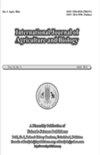小型垂直水培结构对土壤中植物生长的资源利用效率评价
Q2 Agricultural and Biological Sciences
引用次数: 1
摘要
这项研究的目的是调查使用小型垂直农业结构作为提高农业资源利用效率的替代方案。为了实现这一目标,Fordhook巨型瑞士甜菜于2019年2月至11月在彼得马里茨堡Mkondeni的Ukulinga研究农场种植了两个种植季节。主要因素是生长方法。子因子为光照提供和营养液浓度。水培结构的土地利用效率显著高于盆栽(第一季(CS1)为3041.05 g.m-2比405.89 g.m-2,CS2为3106.41 g.m-2和464.53 g.m-2),p<0.0005。水培结构的作物水分生产率显著高于盆栽(CSL中8.45 g.L-1对5.72 g.L-1,CS2中8.44 g.L-1比6.59 g.L-1),CS1中p<0.0005,CS2为p=0.014。在阳光下水培的植物的能量利用效率(CS1中为104.25克KWh-1,CS2中为103.43克KWh-2)显著高于在生长光下水培(CS1为12.30克KWh-3,CS2为12.80克KWh-1)。它也显著高于在生长光照下生长在土壤中的植物(CS1中为8.16克KWh-1,CS2中为9.29克KWh-2),p<0.0005。垂直水培结构比土壤种植具有更高的资源利用效率。研究表明,小型水培结构可以用来提高农业生产力。©2022 Friends Science出版社本文章由计算机程序翻译,如有差异,请以英文原文为准。
Evaluation of the Resource Use Efficiencies of Small-Scale Vertical Hydroponic Structures against Growing Plants in Soil
The aim of this research was to investigate the use of small-scale vertical farming structures as an alternative to improving resource use efficiency in agriculture. To achieve this, Fordhook Giant Swiss chard was grown over two cropping seasons between February and November 2019 at the Ukulinga Research Farm in Mkondeni, Pietermaritzburg. The main factor was the growing method. The sub-factors were light provision and nutrient solution concentration. The hydroponic structures had a significantly higher land use efficiency than the plant pot setup (3 041.05 g.m-2 vs 405.89 g.m-2 in cropping season one (CS1), and 3 106.41 g.m-2 vs 464.53 g.m-2 in CS2), p < 0.0005. The crop water productivity of the hydroponic structures was significantly higher than that of the plant pot setup (8.45 g.L-1 vs 5.72 g. L -1 in CS L and 8.44 g.L-1 vs 6.59 g.L-1 in CS2), p < 0.0005 in CS1 and p = 0.014 in CS2. The energy use efficiency of plants grown hydroponically under sunlight (104.25 g. KWh-1 in CS1 and 103.43 g. KWh-1 in CS2) was significantly higher than that of plants grown hydroponically under grow lights (12.30 g. KWh-1 in CS1 and 12.80 g. KWh-1 in CS2). It was also significantly higher than plants grown in soil under grow lights (8.16 g. KWh-1 in CS1 and 9.29 g. KWh-1 in CS2), p < 0.0005. The vertical hydroponic structures had higher resource use efficiencies than soil planting. The research showed that small-scale hydroponic structures can be used to improve agricultural productivity. © 2022 Friends Science Publishers
求助全文
通过发布文献求助,成功后即可免费获取论文全文。
去求助
来源期刊

International Journal of Agriculture and Biology
AGRICULTURE, MULTIDISCIPLINARY-
CiteScore
1.70
自引率
0.00%
发文量
40
审稿时长
5 months
期刊介绍:
Information not localized
 求助内容:
求助内容: 应助结果提醒方式:
应助结果提醒方式:


